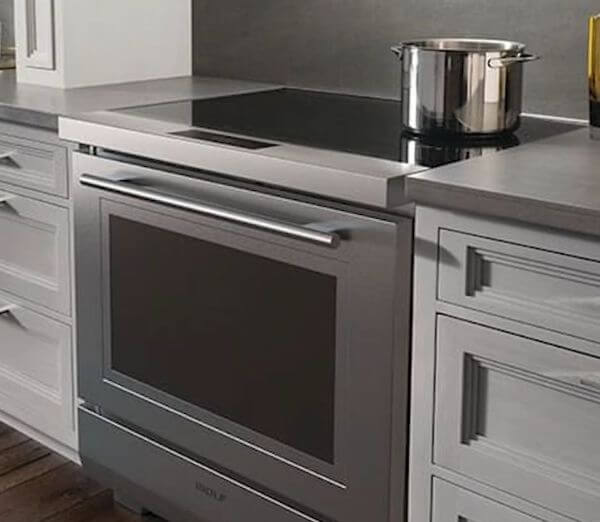When it comes to kitchen appliances, energy efficiency has become an increasingly important consideration. Induction ranges have gained popularity for their fast cooking times and precise temperature control, but do they actually use less electricity compared to other types of ranges?
In this article, we’ll delve into the world of induction ranges and explore their energy efficiency, helping you understand whether they can save you electricity and reduce your energy bills. So, let’s dive in and uncover the truth about induction ranges and their impact on energy consumption!

Table of Contents
Understanding Induction Cooking
Induction cooking utilizes electromagnetic fields to directly heat the cookware, unlike traditional gas or electric ranges that heat the surrounding air or heating elements. Induction ranges feature a smooth, glass-ceramic cooktop and require cookware made of ferrous metal, such as stainless steel or cast iron, to function.
The Efficiency of Induction Cooking
- Energy Transfer: Induction cooking is highly efficient in terms of energy transfer. The magnetic field induces electrical currents in the cookware, generating heat directly within the pot or pan. This direct transfer of heat minimizes energy loss, resulting in faster and more efficient cooking.
- Instant Heat and Precision: Induction ranges offer rapid heating capabilities, often surpassing the speed of gas or electric ranges. They provide instant heat when the cookware is placed on the induction cooktop and can quickly adjust to changes in temperature settings. This precision helps reduce energy waste and allows for more accurate cooking control.
- No Wasted Heat: Traditional gas and electric ranges can lose a significant amount of heat due to the open flame or radiant heat from the burner elements. In contrast, induction cooking only generates heat within the cookware itself, eliminating wasted heat and reducing energy consumption.
Comparing Energy Efficiency
- Gas vs. Induction: Gas ranges have long been considered an energy-efficient option due to their direct heat and quick response time. However, induction ranges can rival gas ranges in terms of efficiency. While gas ranges still have an advantage in terms of the overall cost of energy (depending on local gas and electricity prices), induction ranges are highly efficient in converting energy into heat and provide faster cooking times.
- Electric Resistance vs. Induction: Electric resistance ranges, which rely on heating elements to produce heat, can be less efficient compared to induction ranges. Induction ranges offer better energy efficiency by directly heating the cookware, reducing energy waste and resulting in lower electricity consumption.
Additional Factors to Consider
- Cookware Selection: Induction cooking requires the use of cookware made of ferrous metal. If you don’t already own compatible cookware, you may need to invest in induction-friendly pots and pans. This cost should be factored in when considering the overall efficiency and cost savings of an induction range.
- Standby Power: Induction ranges typically have standby power consumption, which is the energy used when the range is plugged in but not in use. While this standby power is relatively low, it is worth considering as part of the overall energy consumption of the appliance.
- User Habits and Cooktop Size: Energy efficiency can also be influenced by user habits and the size of the cooktop. Using the appropriate cookware size for each burner and avoiding excessive preheating can help optimize energy usage. Additionally, induction ranges with larger cooktops may consume more electricity if not used efficiently.
Energy Savings and Cost Considerations
While induction ranges are generally energy-efficient, the actual energy savings and cost implications depend on various factors, including your cooking habits, energy rates, and the specific model of the induction range. To assess the potential energy savings, compare the energy consumption ratings of different induction ranges, consider your cooking frequency and patterns, and evaluate local electricity prices.
Environmental Benefits
Using an energy-efficient induction range not only saves electricity and reduces energy bills but also has environmental benefits. By minimizing energy consumption, induction ranges contribute to a reduction in greenhouse gas emissions and help promote a more sustainable lifestyle.
—
Induction ranges are known for their fast cooking times, precise temperature control, and efficient energy transfer. While they offer significant advantages in terms of energy efficiency compared to traditional electric resistance ranges, their efficiency can be on par with or even surpass that of gas ranges. Induction cooking minimizes wasted heat, provides instant heat, and offers precise temperature control.
When considering the overall energy consumption and cost savings, factors such as cookware compatibility, standby power, user habits, and cooktop size should be taken into account. By choosing an energy-efficient induction range and optimizing your cooking practices, you can enjoy the benefits of faster, more precise cooking while potentially reducing your electricity consumption and environmental impact.
